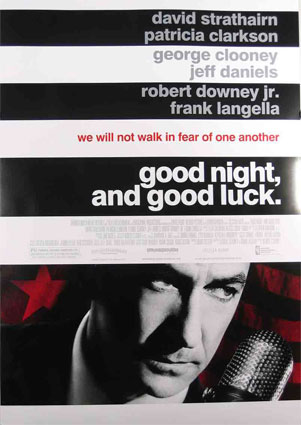
Journalism is not what it used to be. Many argue that it has lost its bite; others believe it has become mired in bias. The real reasons probably run much deeper than that. Whatever the reasons, however, Good Night and Good Luck. shows how journalism can and should function for the benefit of the people.
The plot follows CBS journalist Edward R. Murrow's (David Strathairn) battle against Wisconsin senator Joseph McCarthy (represented by actual footage of the senator), who waged a frightening battle against suspected American communists and who also gained a horrifying amount of power and influence due to this battle. Murrow follows McCarthy's actions and sees them for what they are -- an affront against the freedoms of Americans (freedom of assembly, freedom of speech and so on). To Murrow, there is only one response to McCarthy -- use the facts to expose McCarthy for what he really is.
It is not an easy road. Sponsors pull away from CBS in droves. McCarthy flings vicious insults at Murrow and accuses him of being a member of an antiquated workers union. But Murrow does have support at CBS. His producer, Fred Friendly (George Clooney, who also directed and co-wrote the movie), believes as strongly in what Murrow is doing as the man himself. Fellow reporter Joseph Wershba (Robert Downey Jr.) is also a supporter. Amidst an enormous amount of pressure, Murrow and his news team work to take down McCarthy.
One of the arguments made against Murrow concerns the issue of bias -- because he is arguing so strongly against McCarthy, it means Murrow has lost his objectivity and is not presenting "both sides of the story." (Which is really one of the biggest problems with the theory of objectivity in journalism -- that stories have two sides to present.) Murrow's counterargument is that he is telling the facts and nothing more; if the facts run counter to McCarthy's delusions, then so be it. There is no worth in reporting the delusions of a mad man as if they were fact.
This is a complex problem the movie deals with. Who decides which facts are the facts and which are not? When is right to tell just one side of the story, and when is it not? Good Night, and Good Luck. seems to me to be an argument against "pure" objectivity in journalism. Murrow sees a problem -- one he believes affects the rights of every American -- and he reports on it in a strong way. Some believe this is unfair; Murrow believes the unfairness of what McCarthy does far overrides the supposed unfairness of Murrow's reporting.
As it always is when journalism is the subject, freedom of speech is a strong theme throughout the movie. Murrow defends this right and uses it often -- and how he uses it! Strathairn is about as powerful as it gets when he launches into Murrow's famous speeches. Listening to him makes me want to stand up and spend every second of the rest of my existence stridently defending every right outlined in the American Constitution. Good Night, and Good Luck. shows why we have freedom of speech in the first place -- so that we can think and challenge our leaders and protect our rights as human beings and American citizens.
This should be obvious to anyone who sees the movie, but Clooney's reasoning for making the movie is directly connected to the current political climate: "I thought it was a good time to raise the idea of using fear to stifle political debate." How many times were people who opposed the Iraq War chastised as being "un-American"? How much has xenophobia been used to justify egregious trespasses into the privacy of American citizens? How many of our politicians -- Democrats and Republicans alike -- stood back and watched while America blundered its way into an ongoing war because we were afraid of another attack on our soil? Fear and paranoia never fuel intelligent political discourse and rational action. They simply drive our primal instincts to lash out at what irritates our prejudices.
Good Night, and Good Luck. is like great journalism -- it tells its story straight and true, with no frills, and cuts right to the heart of the matter. Experiencing it gives one the sense of knowing exactly what is happening and why, and why what is being experienced is worth believing.
Now for a video! This scene shows Murrow giving one of his speeches about freedom of speech. I hope it resonates strongly with everyone who watches it.